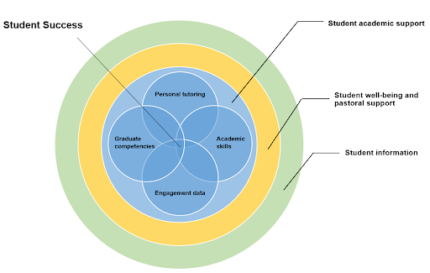Academic support for students is an essential component of their academic success. At a time when resources are stretched, it is critical that academic support structures operate as a well-oiled machine, where each component has a clearly defined purpose and operates effectively as a whole.
We previously discussed how personal and pastoral tutoring, provided by academic staff, needs to be supplemented by specialist academic support. A natural next step is to consider what that specialist support could look like.
A nested model
We’ve identified four core facets of effective academic support, namely personal tutoring (advising/coaching/mentoring etc), the development of academic skills and graduate competencies, all supported by relevant student engagement data. The nested model below displays this framework.
We also suggest two prerequisites to the provision of academic support.
Firstly, a student must have access to information related to what academic support entails and how to access this. Secondly, a student’s wellbeing means that they can physically, mentally, emotionally and financially engage with their studies, including academic support opportunities.
Figure 1: Academic support aspects within a student success nested model
Focusing on academic support
Personal tutoring has a central role to play within the curriculum and within academic provision more broadly in enabling student success.
That said, “academic support” comprises much more than a personal tutoring system where students go for generic advice and support.
Rather, academic support is an interconnected system with multiple moving parts tailored within each institution and comprising different academic, professional and third-space stakeholders.
Yet academics remain fundamental to the provision of academic support given their subject matter expertise, industry knowledge and their proximity to students. This is why academics are traditionally personal tutors and historically, this is where the academic support model would have ended. Changes in student needs means the nature of personal tutoring has needed to be increasingly complemented by other forms of academic support.
Skills and competencies
Academic skills practitioners can offer rich insights in terms of how best to shape and deliver academic support.
A broad conception of academic skills that is inclusive of academic literacies, maths, numeracy and stats, study skills, research and information literacy and digital literacy is a key aspect of student academic success. Student acquisition of these skills is complemented by integrated and purposeful involvement of academic skills practitioners across curriculum design, delivery and evaluation.
Given regulatory focus on graduate outcomes, universities are increasingly expected to ensure that academic support prepares students for graduate-level employability or further study upon graduation. Much like academic skills practitioners, this emphasises the need to include careers and employability consultants in the design and delivery of integrated academic support aligned to the development of both transferable and subject-specific graduate competencies.
Engaging data
Data on how students are participating in their learning provides key insights for personal tutors, academic skills practitioners and colleagues working to support the development of graduate competencies.
Platforms such as StREAM by Kortext enable a data-informed approach to working with students to optimise the provision of academic support. This holistic approach to the sharing of data alongside actionable insights further enables successful transition between support teams.
Knowing where the support need is situated means that these limited human and financial resources can be directed to where support is most required – whether delivered on an individual or cohort basis. Moreover, targeted provision can be concentrated at relevant points over the academic year. Using engagement data contributes to efficiency drives through balancing the provision of information and guidance to all students. The evidence shows it’s both required and likely to prove effective.
Academic support is increasingly complicated in terms of how different aspects overlap and interplay within a university’s student success ecosystem. Therefore, when adopting a systems-thinking approach to the design and delivery of academic support, universities must engage key stakeholders, primarily students, academic skills practitioners and personal tutors themselves.
A priority should be ensuring varied roles of academic support providers are clearly defined both individually and in relation to each other.
Similarly, facilitating the sharing of data at the individual student level about the provision of academic support should be prioritised to ensure that communication loops are closed and no students fall between service gaps.
Given that academic support is evolving, we would welcome readers’ views of what additional aspects of academic support are necessary to student success.
To find out more about how StREAM by Kortext can enable data-informed academic support at your institution, why not arrange a StREAM demonstration.













